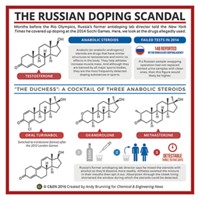Advertisement
Grab your lab coat. Let's get started
Welcome!
Welcome!
Create an account below to get 6 C&EN articles per month, receive newsletters and more - all free.
It seems this is your first time logging in online. Please enter the following information to continue.
As an ACS member you automatically get access to this site. All we need is few more details to create your reading experience.
Not you? Sign in with a different account.
Not you? Sign in with a different account.
ERROR 1
ERROR 1
ERROR 2
ERROR 2
ERROR 2
ERROR 2
ERROR 2
Password and Confirm password must match.
If you have an ACS member number, please enter it here so we can link this account to your membership. (optional)
ERROR 2
ACS values your privacy. By submitting your information, you are gaining access to C&EN and subscribing to our weekly newsletter. We use the information you provide to make your reading experience better, and we will never sell your data to third party members.
Biological Chemistry
The Olympics are here
by Bibiana Campos Seijo
August 8, 2016
| A version of this story appeared in
Volume 94, Issue 32
The Olympics are finally here. The opening ceremony kicked things off last Friday, and you can expect to hear or see coverage about the games until at least their last day on Aug. 21.
I have always watched the games on TV and thoroughly enjoyed them. Growing up, I remember watching Carl Lewis—who won 10 Olympic medals in his career—breaking the 100-meter record. More recently, I have enjoyed swimmer Michael Phelps beating all records in the pool and arguably becoming the best Olympian of all time with a total of 22 medals. By the way, if the mention of Phelps and swimming pools makes you wonder, does he pee in it? The answer is yes, and I recommend you visit cenm.ag/pool, not only to watch a video of him admitting it, but also to read our special report on the chemical reactions between disinfectants and organic matter—sweat, urine, and personal care products—that take place in swimming pools everywhere.
In any case, I don’t remember the buildup to the Olympic Games ever being a smooth process. Chaos and rumors often dominate headlines leading up to the games: Will the stadium be ready on time? How much over budget have the organizers gone? But the buildup to the 2016 Games in Brazil has been the most turbulent I can remember. In fact, Rio is regarded as one of the least-prepared host cities in Olympic history.
The country is in the middle of a huge financial—the worst recession in a century—and political crisis. This is in great part due to the fact that president Dilma Rousseff has been stripped of her duties for an impeachment trial. The interim government is being led by vice president Michel Temer, who himself also faces impeachment and has been investigated for briberies and kickbacks on two occasions. A massive corruption scandal at Petrobras, Brazil’s national oil company, is also adding to the instability.
The country is also struggling with a Zika epidemic. Brazil is the hardest hit by the virus, and the state of Rio de Janeiro has reported the second-highest number of cases in the country.
The U.S. Centers for Disease Control & Prevention has said there is little likelihood that any of the more than half-a-million attendees at the games will acquire the virus and carry it home. Despite this, some athletes have withdrawn from the games because of the risk of contracting the virus. Brazilian government officials regret this “overreaction,” especially given that winter has arrived in Brazil thus the number of suspected cases has fallen dramatically.
And as it is now typical of every Olympics, doping scandals are never far away from the headlines. Allegations arose claiming Russia had encouraged its athletes to use performance-enhancing steroids, which has resulted in the International Olympic Committee “reversing the presumption of innocence” for Russian athletes. They now have to prove to their respective international sports federations that they are clean. You can learn more about antidoping technology on page 26 and get the backstory of the Russian scandal in our latest edition of Periodic Graphics with chemistry educator and Compound Interest blogger Andy Brunning on page 28.
The last straw is the pollution problems that are sure to be an issue for water sports at the Rio Games. Marina da Glória, the base for Olympic sailing and windsurfing events, is a large body of water fed by excrement- and litter-filled streams and rivers, including one that pours past a wastewater treatment plant that was built in the 1990s but was never connected. According to Reuters, a team of researchers from the Federal University of Rio de Janeiro recently found antibiotic-resistant super bacteria—of a strain that’s associated with sewage that causes potentially lethal infections—on the beaches and in the lakes where swimming, rowing, and canoeing events will take place. Given that the theme of this year’s games is sustainability, it looks like officials have missed the mark.
Given the buildup, the Rio games are set to be quite tumultuous and full of surprises. I think one of them will be Phelps.
Views expressed on this page are those of the author and not necessarily those of ACS.






Join the conversation
Contact the reporter
Submit a Letter to the Editor for publication
Engage with us on Twitter